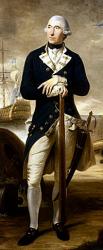1722 - 1765 Hymnal Number: d63 Author of "Come, humble sinner, in whose breast" in The Baptist Harmony Jones, Edmund, son of the Rev. Philip Jones, Cheltenham, was born in 1722, and attended for a time the Baptist College at Bristol. At the age of 19 he began to preach for the Baptist Congregation at Exeter, and two years afterwards he became its pastor. In 1760 he published a volume of Sacred Poems. After a very-useful ministry he died April 15, 1765. From an old manuscript record of the Exeter Baptist Church, it appears that it was under his ministry in the year 1759, that singing was first introduced into that Church as a part of worship. As a hymn-writer he is known chiefly through:—
Come, humble sinner, in whose breast. This hymn appeared in Rippon's Baptist Selection, 1181, No. 355, in 1 stanza of 4 lines, and headed, "The successful Resolve—'I will go in unto the King,' Esther iv. 16." It has undergone several changes, including:—
1. "Come, sinner, in whose guilty breast." In the Methodist Free Church Sunday School Hymn Book, 1860.
2. “Come, trembling sinner, in whose breast." This is in a great number of American hymn-books.
3. “Come, weary sinner, in whose breast." Also in American use.
Miller, in his Singers & Songs of the Church, 1869, p. 333, attributes this hymn to a Welsh Baptist hymn-writer of Trevecca, and of the same name. Rippon, however, says in the first edition of his Selection that Edmund Jones, the author of No. 333, was pastor of the Baptist Church at Exon, Devon. This decides the matter. [Rev. W. R. Stevenson, M.A.]
--John Julian, Dictionary of Hymnology (1907)
================
Jones, Edmund, p. 605, ii. In The Church Book, by L. W. Bacon, N. Y., 1883, No. 279 begins with stanzas ii. of Jones's hymn, "Come, humble sinner, &c," and begins:—"I'll go to Jesus, though my sin." Also note that in that article the words “author of No. 333," should read "author of No. 355."
--John Julian, Dictionary of Hymnology, Appendix, Part II (1907)
Edmund Jones


 My Starred Hymns
My Starred Hymns




